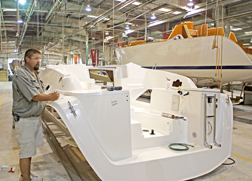Commissioner Scott Jamison voted against the audit by Kessler International, which is estimated to cost between $5,000 and $10,000. A recognized leader in international corporate investigation, Kessler advertises its forensic accounting company as the place “where lies go to die.”
CRA Chair Bob Barnas hopes to uncover whether money transferred has been accounted for, and that the money spent on school renovations conformed to state statute. For the school projects, the City lists the amount budgeted from the 2011-2012 fiscal year as $128,915. At the time, there were not enough funds to complete the project, and the CRA voted to obtain a line of credit from the bank to cover the difference, budgeted at $85,800, Finance Services Director Helen McIver said.
The auditors will also look into management fee transfers from the CRA to the general fund. Management Fee transfers over the past four years include $70,000 in 2009, $70,000 in 2010, $95,000 in 2011 and $95,000 in 2012, McIver said.
While Barnas is concerned that funds within the CRA, a special district, might be an illegal use on City building renovations, he is uncertain about the Florida statue detailing CRA limitations and guidelines. He hopes the Kessler audit will clarify how CRA funds are allowed to be distributed.
“I think to not do this would be a disservice to the taxpayers in the City of High Springs, and the business owners who can benefit from improving funds and doing it the proper way,” Barnas said.
An audience member stated she felt the $10,000 price tag was steep for an audit that could be completed in a week. She questioned whether the board had received bids from any other companies.
Barnas said he had researched other companies, but felt Kessler was the best choice.
“From what I glean from the discussion so far, as Mrs. Weller stated, would not an attorney be able to answer some of these questions without a complete forensic audit,” Resident Barbara Miller asked. “It’s been done. You have the wherewithal to do differently in 2013. I don’t know why you need a $10,000 audit.”
Stating that the cost of the audit was high, Miller asked Barnas what he hoped to find that could be corrected. In response, Barnas said he wanted to understand how the City should properly handle CRA funds, and the board could “apparently not” get these answers anywhere else.
Board members Ann Carter and Sylvia Newcomb agreed with Barnas that the audit needed to be conducted.
“If there’s anyone here today that feels that they are qualified and will vouch for its correctness as to how the CRA should be managed, please step forward and save the City $10,000,” Carter said. “However, with that said, I personally, sincerely, do not feel like that will happen. So, in order for us not to throw good money to bad, we need to do this.”
Recently, the first-draft of the MAXIMUS cost allocation plan suggested the CRA transferred approximately $45,000 to $50,000 more than the City required. During the meeting, Commissioner Sue Weller made a motion that requires High Springs to pay the CRA back for any funds over the amount deemed necessary by the final draft of the study. It passed unanimously.
Kessler proposed a three-phase audit followed by an evaluation of the findings. In Phase One, Kessler establishes a working relationship with the City of High Springs, introducing its staff members to City employees. Kessler will also identify and gain access to any documentation required for the audit.
The company’s Phase Two involves a detailed review of records, such as general ledger accounts, check registers and additional records provided relative to the financial assets of the CRA.
In Phase Three, Kessler intends to identify specific areas of concern and to complete further in-depth investigation techniques, including interviews and database research.
The CRA board also voted to move the $10,000 into the professional services budget item to provide payment to Kessler International. In addition, CRA Board Member Sue Weller made a motion to create a checking account separate from the City’s finances, and the motion passed four to three.
# # #
Email awilliamson@
alachuatoday.com
CRA orders $10,000 audit on past projects
By AMANDA WILLIAMSON
Today Reporter
HIGH SPRINGS – Despite protests from a small group attending the High Springs Community Redevelopment Agency (CRA) meeting on Tuesday, the CRA voted 6-1 in favor of moving forward with an audit involving money transferred from CRA funds to the City of High Springs, and funds spent on renovating the town’s old school.
Commissioner Scott Jamison voted against the audit by Kessler International, which is estimated to cost between $5,000 and $10,000. A recognized leader in international corporate investigation, Kessler advertises its forensic accounting company as the place “where lies go to die.”
CRA Chair Bob Barnas hopes to uncover whether money transferred has been accounted for, and that the money spent on school renovations conformed to state statute. For the school projects, the City lists the amount budgeted from the 2011-2012 fiscal year as $128,915. At the time, there were not enough funds to complete the project, and the CRA voted to obtain a line of credit from the bank to cover the difference, budgeted at $85,800, Finance Services Director Helen McIver said.
The auditors will also look into management fee transfers from the CRA to the general fund. Management Fee transfers over the past four years include $70,000 in 2009, $70,000 in 2010, $95,000 in 2011 and $95,000 in 2012, McIver said.
While Barnas is concerned that funds within the CRA, a special district, might be an illegal use on City building renovations, he is uncertain about the Florida statue detailing CRA limitations and guidelines. He hopes the Kessler audit will clarify how CRA funds are allowed to be distributed.
“I think to not do this would be a disservice to the taxpayers in the City of High Springs, and the business owners who can benefit from improving funds and doing it the proper way,” Barnas said.
An audience member stated she felt the $10,000 price tag was steep for an audit that could be completed in a week. She questioned whether the board had received bids from any other companies.
Barnas said he had researched other companies, but felt Kessler was the best choice.
“From what I glean from the discussion so far, as Mrs. Weller stated, would not an attorney be able to answer some of these questions without a complete forensic audit,” Resident Barbara Miller asked. “It’s been done. You have the wherewithal to do differently in 2013. I don’t know why you need a $10,000 audit.”
Stating that the cost of the audit was high, Miller asked Barnas what he hoped to find that could be corrected. In response, Barnas said he wanted to understand how the City should properly handle CRA funds, and the board could “apparently not” get these answers anywhere else.
Board members Ann Carter and Sylvia Newcomb agreed with Barnas that the audit needed to be conducted.
“If there’s anyone here today that feels that they are qualified and will vouch for its correctness as to how the CRA should be managed, please step forward and save the City $10,000,” Carter said. “However, with that said, I personally, sincerely, do not feel like that will happen. So, in order for us not to throw good money to bad, we need to do this.”
Recently, the first-draft of the MAXIMUS cost allocation plan suggested the CRA transferred approximately $45,000 to $50,000 more than the City required. During the meeting, Commissioner Sue Weller made a motion that requires High Springs to pay the CRA back for any funds over the amount deemed necessary by the final draft of the study. It passed unanimously.
Kessler proposed a three-phase audit followed by an evaluation of the findings. In Phase One, Kessler establishes a working relationship with the City of High Springs, introducing its staff members to City employees. Kessler will also identify and gain access to any documentation required for the audit.
The company’s Phase Two involves a detailed review of records, such as general ledger accounts, check registers and additional records provided relative to the financial assets of the CRA.
In Phase Three, Kessler intends to identify specific areas of concern and to complete further in-depth investigation techniques, including interviews and database research.
The CRA board also voted to move the $10,000 into the professional services budget item to provide payment to Kessler International. In addition, CRA Board Member Sue Weller made a motion to create a checking account separate from the City’s finances, and the motion passed four to three.
Email awilliamson@alachuatoday.com
Add a comment

 Hunter Marine will have all six of its production lines running for the first time since 2009. The Alachua production facility will produce Hunter sailboats, Mainship trawlers and Gemini catamarans
Hunter Marine will have all six of its production lines running for the first time since 2009. The Alachua production facility will produce Hunter sailboats, Mainship trawlers and Gemini catamarans HIGH SPRINGS – After less than six months, the City of High Springs is on the hunt for a city attorney yet again. On Wednesday, July 11, Ray Ivey of the Law Offices of Scruggs & Carmichael, P.A. in Gainesville announced his resignation from the post as the High Springs city attorney.
HIGH SPRINGS – After less than six months, the City of High Springs is on the hunt for a city attorney yet again. On Wednesday, July 11, Ray Ivey of the Law Offices of Scruggs & Carmichael, P.A. in Gainesville announced his resignation from the post as the High Springs city attorney.
